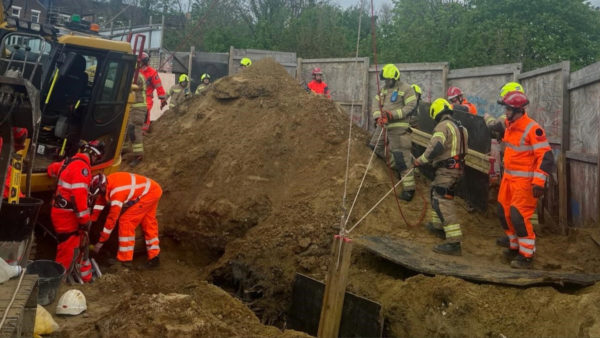Bringing the clerk of works into the contractor’s team can help raise building standards, argues Mark Beard
Over the last few years, particularly since the Edinburgh schools collapse and the Grenfell Tower tragedy, there has been considerable debate about the clerk of works and how the role can help our industry ensure higher levels of quality for our customers.
Historically, I have been sceptical about what value the clerk of works brings to a project. But a few weeks ago, visiting one of our projects in Oxford, the penny dropped. I am a now convert. In fact, I am now a huge fan of using the skills of clerks of works on building projects to maximise product quality – which is very different from their traditional role.
If I purchase a new car from BMW, Ford, Honda or any of the major car manufacturers, they would not countenance me sending an independent inspector to check the quality of their product during manufacture. They would be confused and angry by the suggestion. Their reputation is built on getting it right first time through their own thorough checking and pride in their product. This is the way our industry should behave; snagging is for the contractor, not a clerk of works employed by the client.
Different way forward
I used to think the clerk of works role overlapped with the site manager or finishing foreman and could be divisive. But on our project at St Hilda’s College in Oxford, our customer and retained consultants agreed a different way forward. We, the contractor, would directly employ the clerk of works, who would work as part of our team, reporting to our customer at any time, but mainly helping us deliver the highest possible standard building.
The clerk of works in question is very experienced, working ‘client side’ on many projects. Where we have had problems, we have been open with him and he has helped us find solutions. This openness has built three-way trust with customer and consultants and avoided duplicate snagging at end of the project, giving greater role clarity and a more efficient team.
There will still be projects where customers benefit from engaging a clerk of works directly. However, I do find it perverse when customers feel it is good practice to squeeze the contractor and supply chain down on price, then invest part of the saving in a duplicate checking regime.
Contractors and clerks of works may find it awkward working as part of the same team, after many years of forced division. But, as the Grenfell Inquiry is increasingly highlighting, the sooner we take full ownership for the quality of our work, and the sooner the customer can look to a single organisation to take responsibility, the better.
Mark Beard is chairman of Beard Group and president of the CIOB
Comments
Comments are closed.










Good idea Mark, but include the CoW in the team as the Site Quality Manager.
Then get the designers to join the integrated team and we can then at last become a respected manufacturing industry.
As a professional project manager with over 30 years experience on various types of multi-million-pound projects I have long been an advocate of the benefits of an independent Clerk of Works. I believe that this should be a Client appointment, however, it is essential that the appointed Clerk of Work must work on a collaborative basis with and for the ultimate benefit of both sides and the overall project.
The Clerk of Works I have worked with have always enjoyed good relationships with contractors who have valued their input and help.
As a Clerk of Works I often find that Contractors resent my presence on site as they see me as someone who is continually trying to stop them from working, interfering or delaying their operations on site.
My stance is that I am another pair of eyes seeing things (often from the Client’s side) to improve the quality or design issues which arise on site, and having seen design failures previously, trying to avoid future failures / design issues.
At the end of the day, it is a game of football – with the contractors and myself scoring in the same goal. We finish the contract on time (or earlier), we achieve the standards required, everybody is happy. Not rocket science.
I should like to take issue with Mark Beard, and at the same time agree with his proposition that construction sites need a skilled experienced overseer to ensure that the client gets what he is paying for, per the contract, not just quality, also to give advice on changes, monitoring schedule adherence, resolving queries, keeping records, reporting to client, liaising with consultants and client.
Generally a Clerk of Works had a trade background, and as such was an older individual who had come up through the ranks, generally with contactors and had “seen it all in his time”. Whether such persons exist today with site management,(rightly), run by university graduates, I dont know.
I am surprised at Mark bringing up the old chestnut of comparison of quality control, construction viz a viz car production. He knows full well that such comparison is apples and oranges. The same model car is produced in its thousands in factory environments, with quality control and inspection at every step of the way, even in suppliers and subcontractors premises, whereas every construction project is different and in all weathers outside, not to mention the untimely changes, late information, getting paid and retentions (cash flow), so many consultants sometimes so little coordination, ever changing regulations, none of which are faced in the car industry.
I believe it is naïve to think that a Clerk of Works, in the last analysis, especially in contentious expensive disputes is going to support the client over the hand that feeds him, plus is always open to corruption, therefore I believe the client must employ him. Going back to cars, the manufacturer employs dozens of inspectors for a factory produced product, surely construction can justify and pay for just one on site?
John Porter FCIOB
Colin, Derek, John and John Thank you for all your views, really appreciated. There are no absolutely right answers when it comes to ensuring we deliver our customers the highest possible quality we can. Our views will be strongly influenced by our experiences; having the debate all helps to keep quality top of all our thoughts. Mark
It is all about mind set. A good Clerk will instill a bond of collaboration between himself and the contractor, a partnership in which they both wish to achieve the same outcome, a succesful completion of a project which is quality driven. Attitudes have changed but people still regard the Clerk as a (choose your own expletive) when in reality a modern clerk get to know the operatives on site, their names, about themselves and what they do. Construction has changed, the mental health of the operatives can reflect in their work. A good Clerk can encourage a site manager and give support and guidance from the experience they bring to the site.
Its in the clerks interest that the contractor succeeds. Contractors are under pressure to produce (mainly due to margins) and Time is one of the worst enemies to quality. If you look at a JCT contract the COW is only mentioned a couple of times with very little power other than recomendation and then its up to the client and the Employers Agent whether to take that on board. When it comes to H&S ofcourse its a different matter because they are the extra eyes on site if anyone tries to turn a blind one.
I would like to see the Clerk have more contractual powers written into the likes of the JCT contract or NEC contracts (Project Supervisor).
Mark, back in the early 1980’s I worked as a Clerk of Works for the DOE and my role there was very much the same as any Clerk today, working closely with all main contractors, subcontractors and clients. I was employed direct by the client but worked as a team player encouraging both main contractor and subcontractor to adopt the attitude of collaborative working, becoming one team with the same goal, a project on budget, on time, to the quality expected. After over 45 years in the industry I appreciate things have changed and COW’s are not on site like they used to be, that said I still think they would offer valued experience and knowledge but agree with Derek that they should be employed direct by the client. I have worked with many COW’s back in the mid to late 1980’s and 1990’s when I was a Project Manager on multi million pound projects and found most of them to be really helpful, professional, and work as part of the site team. I believe that the modern COW does have a place in todays environment on site and can work as a team player looking after both the contractors interest and the clients interest. We have the same goal, a safe, successful, and profitable project.